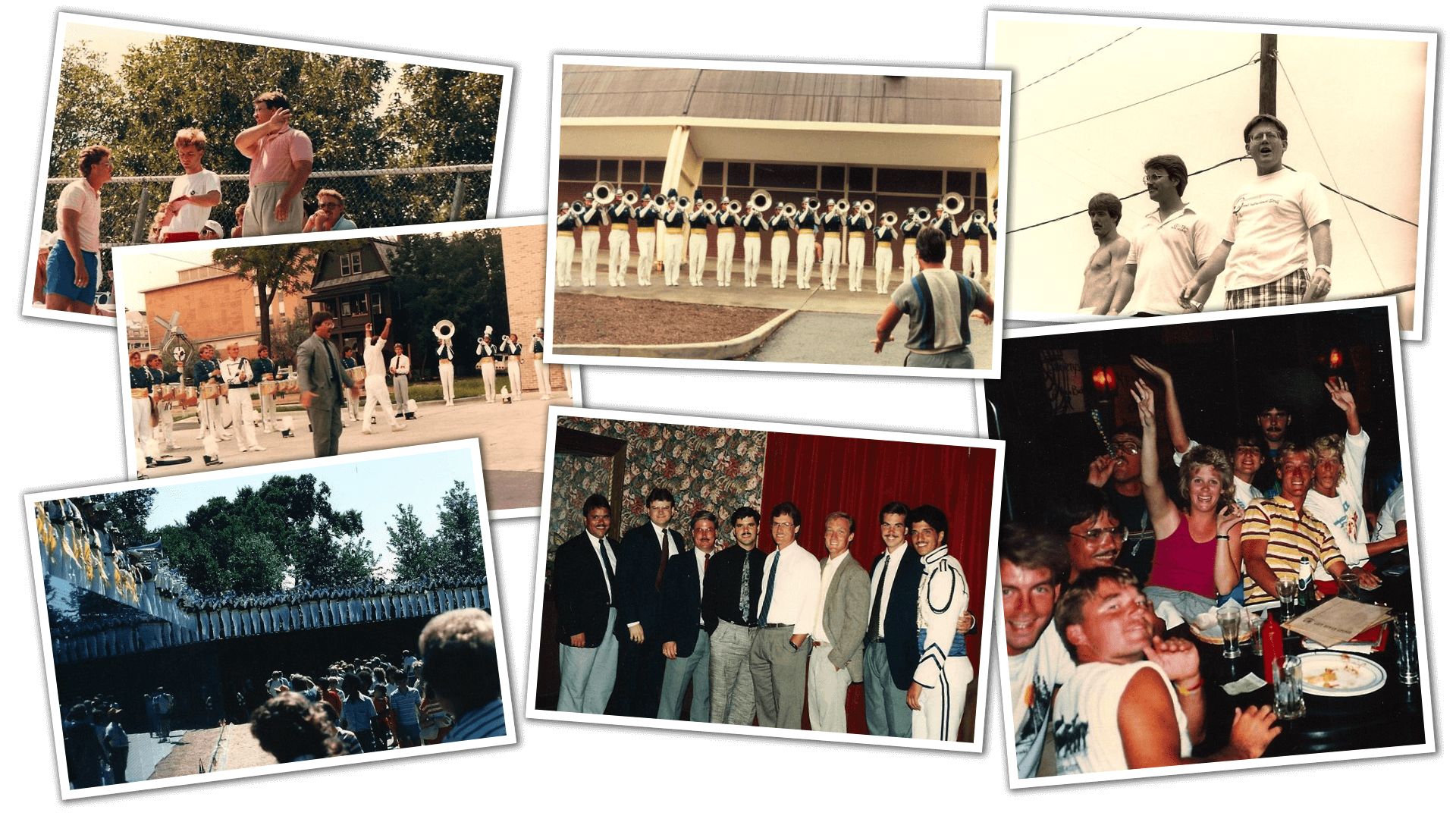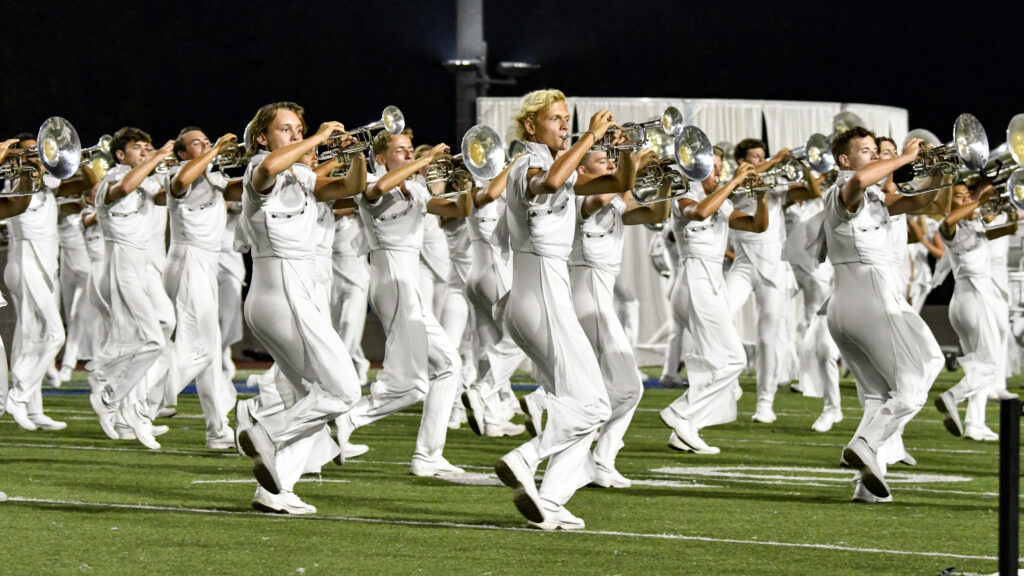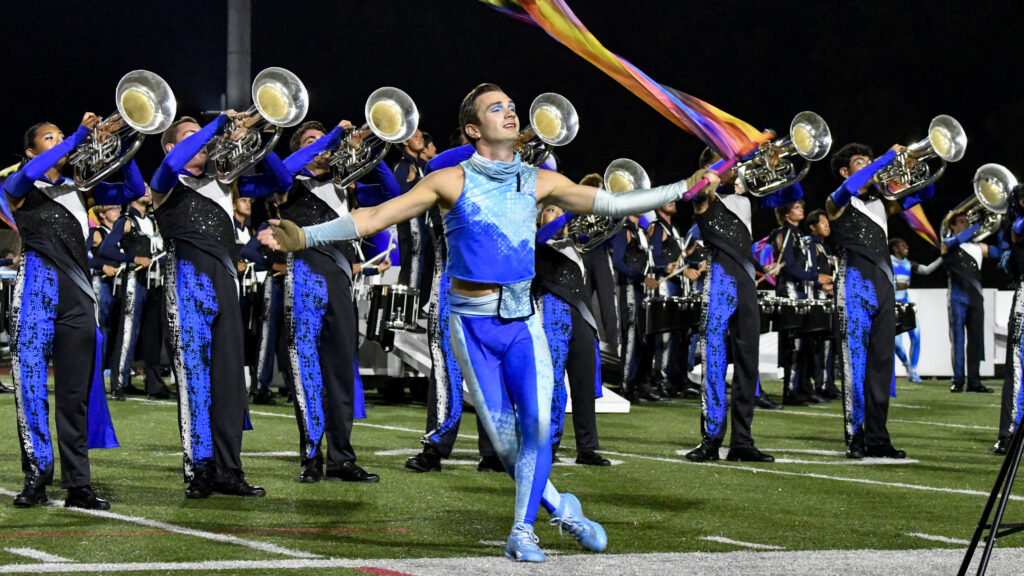Prolific concert band composer and music educator Robert W. Smith, who in the 1980s broke new ground writing original music composed specifically for the drum corps idiom, died on Thursday in Montgomery, Alabama. He was 64.
Smith’s wife Susan reported his death on Facebook, the result of complications from cardiac surgery.
The path to the “football field stage” of the drum corps and marching band universe has been an interesting journey for this award-winning composer and educator who has penned more than 600 compositions with multiple credits in television and motion pictures.
According to Smith, who was inducted into the DCI Hall of Fame in 2010, it all began thanks to a small drum corps out of Troy, Alabama, called the Charioteers.
“I must give credit where credit is due, and I have to begin with the corps that were willing to take a chance on a very young and very opinionated writer,” Smith said during his DCI Hall of Fame induction in August of 2010. “The Charioteers introduced me to Drum Corps International, and I sat there in 1976 in Philadelphia at Franklin Field and went, wow, there’s something here, and there’s something for me.”
In the early 1980s, Smith hooked up with the fledgling central Florida-based drum corps, Suncoast Sound. It was here he played an integral role in creating some of the most innovative and thought-provoking productions of all-time, changing the history of Drum Corps International show design for years to come.
It was Suncoast Sound’s 1984 “Vietnam” show, themed on the turbulent era of the 1960s, where Smith was given his first opportunity to pen compositions written solely for the drum corps stage. In one of the most poignant moments of this show, behind a field of white crosses representing fallen soldiers, color guard members raised 28 fabric panels off the ground to reveal the shape of Washington’s Vietnam Veterans Memorial.
Drum Corps International Hall of Fame author Michael Boo wrote: “Smith’s ‘Requiem’ composition provided the backdrop for a young girl to place a bouquet of flowers at one of the crosses, then walk up to the wall, which was quivering as if alive, and take from within it a white balloon of remembrance. As the balloon was released, it was joined by several more from the front sideline. It’s safe to say that the tears emoted by the young girl were duplicated by many in the audience.”
1985’s “Florida Suite” is widely regarded as the first “all-original” themed concept show that marked the first time a composer started with a completely blank slate, thoughtfully composing each section of the production to work for the unique demands of a drum corps ensemble.
In an activity that in its first nearly decade and half primarily focused on arrangements of well-known compositions, Smith’s work on the 1985 production challenged the established norms of drum corps productions, creating a new listening and performance experience for audiences and performers alike.
One of the intriguing footnotes to “Florida Suite” was its critical reception amongst DCI’s judging community. Never before had adjudicators had the need to evaluate a show without having a reference of some point like an established recording of an orchestra or wind ensemble to form an opinion based on the source material.
“I remember listening to the judges’ tapes after the first few shows,” Suncoast Sound percussion arranger Allan Murray said. “There were long silences on the tapes in the beginning because judges were trying to listen and grasp what we were doing and how we were doing it. With nothing to prepare them, they were challenged for the first time to truly react to something they had never heard before and then award a score for that.”

“I remember the words from a DCI judges and instructors meeting that the drum corps activity was defined as the original visual packaging and original visual interpretations to the artful adaption of music from other forms,” Smith recounted. “At our first DCI critique, a judge I love and respect looked at me and asked, ‘Who do you think you are? Are you Stravinsky?’ I told him I didn’t think of myself as Stravinsky, but maybe someday, people would think of me as a composer of repute.”
While Smith is widely credited for spearheading the “all-original” drum corps show design, he was quick to point out in his Hall of Fame induction speech that his work and success with Suncoast Sound was a result of a total team effort.
”People seem to focus on this risk that we took back in the ‘80s called ‘original music,’” Smith said. “But I must tell you that original music was only one part of the equation. And there were some incredible designers that deserve equal credit and equal accolades for those incredible shows.”
Another original set of compositions for Suncoast’s 1988 “Symphonic Dances for the Contemporary Child” according to Boo is “one of the most intriguing, audience-challenging, innovative and controversial shows to hit the field in Drum Corps International competitions.” But the bar had effectively been set as the floodgates opened for show designers to stretch their creative bounds, propelling the drum corps activity to new heights.
“Full of emotion, effect and passion; and the visual program was in full sync with the music,” fellow Drum Corps International Hall of Fame member and composer Jay Bocook said of Smith’s creations. “It changed the way all of us looked at putting shows together. The music was like a great soundtrack to a film.”
After Suncoast Sound, Smith went on to compose and arrange for a laundry list of drum corps including the Spirit of Atlanta, Velvet Knights and Cadets of Bergen County (the corps’ popular 1989 “Les Misérables” show). Smith helped another Florida corps, Magic of Orlando, get off the ground in the early 1990s and in the 2000s lent his talents to corps like the Glassmen, Madison Scouts and Troopers.
Smith’s stint with the Troopers was especially meaningful on a personal level, as his daughter Madison marched as a member of the color guard in 2015 where she also performed a vocal solo composed by her father for the corps’ “Wild Horses” production.
“It’s the most special feeling in the world,” Smith said in a 2015 interview for DCI’s “Field Pass” podcast. “Drum corps has been one of the most amazing parts of my life and my career. I love it, but it is so incredibly special when it’s your child out there.”
Smith is survived by his wife Susan and two daughters Savannah and Madison.
Outside of the drum corps activity, it was Smith’s success both as a composer and in the world of music education that helped to lend credibility to an activity that often struggled to get buy-in from music educators at the high school and collegiate levels that drum corps was a valuable educational experience for their students.
“In a bygone era of drum corps we, as a drum corps society, needed credibility with the band community,” DCI Hall of Fame member Freddy Martin said. “Few have given that credibility as clearly and completely as Robert W. Smith.”
Smith’s ability to stand with feet in both worlds helped to usher in a new era as more and more music majors who would become future band directors, music teachers and performers joined the ranks of Drum Corps International ensembles across the country.
“He had an ability to teach us about music and life, in a way that gave us unlimited potential,” said former Boston Crusader corps director Howard Weinstein who was a member of Suncoast Sound during Smith’s tenure. “Each and every one of us learned and understood the value drum corps had and continues to have in our lives, both on and off the field.”

Smith’s composing credits include more than 600 published works largely through Warner Bros. Publications and the Belwin Concert Band Performance Music catalog. A significant portion of his composing and arranging in his career has been focused on educational compositions for young musicians, many of which have become standards and standard-setting for music educators around the world to teach to their groups. In 2015 Smith launched the RWS Music Company, “committed to producing music of impeccable artistic and educational value,” which not only showcases Smith’s compositions but also works from nearly 20 additional composers.
Even when not working directly for drum corps, Smith’s works have been popular with designers for their playability by performers of all ages. More than 100 Robert W. Smith compositions have been credited within the repertoires of DCI and all-age drum corps’ productions since the 1980s, a quarter of those credits accounting from movements of Smith’s popular “The Divine Comedy” symphonic band symphony composed in the mid-1990s.
Smith’s last credited original compositions on the DCI stage came from Music City’s 2018 and 2019 productions, but in the years since, he stayed closely connected to the DCI community. While nearing Drum Corps International’s 40th anniversary in 2010, he concluded his Hall of Fame induction speech with his vision for the future of DCI, a belief long held throughout his tenure in the marching music industry.
“I think it’s about sustaining the activity for the next generation and moving the activity forward,” Smith said. “It’s important that we reach for the stars. However, the English poet Robert Browning reminds us that a man’s reach should always exceed his grasp … As we reach for those stars, we must not lose our grasp on our audience, and we must not lose our grasp of our primary mission of educating the next generation of incredible performers.”





